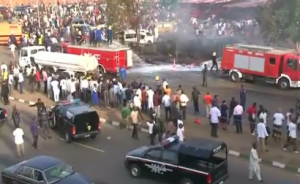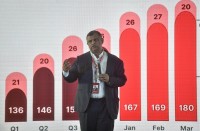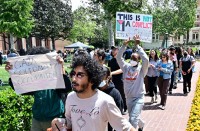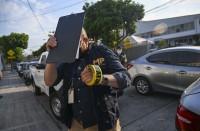
(Reuters) — A bomb explosion at a crowded bus station on the outskirts of Abuja killed at least 35 people during rush hour on Monday (April 14) morning, witnesses said, the first such attack near the Nigerian capital in two years.
Body parts and blood were strewn across the station and an unruly crowd of several hundred onlookers was roaming around with security forces unable to keep them away.
“This morning, some set of individuals they’re trying to go the office this morning, one particular guy was holding a bag and he went into the El Rufai (long luxurious mass commercial bus), he now steps down out of there after some few minutes, he left like five minutes later, that thing there explode, before you could know everybody has died. Immediately this thing happened we ran away for our lives, coming back I saw no less than 30 set of human beings here, while at the Nigeria general hospital they already took like 15 if I’m not mistaken, 14, 15,” said Lukman Aman, resident in Abuja.
A Reuters cameraman saw 20 bodies at the station near Nyanyan bridge, about 8 km (5 miles) south of Abuja. A second Reuters correspondent saw at least 15 bodies separately loaded into waiting ambulances.
Police and the military did not immediately respond to requests for comment.
There was no immediate claim of responsibility but suspicion is likely to fall on Islamist militant group Boko Haram, which has waged an increasingly bloody insurgency in the northeast.
Suspected Islamist militants killed at least 60 people in an attack on a village in northeast Nigeria late last week.
Eight people were killed in a separate attack at a teachers training college.
The Islamists, who want to carve an Islamic state out of Nigeria, have in the past year mostly concentrated their onslaught in the northeast, where their insurgency started.
There had been no attacks near the capital since suicide car bombers targeted the offices of Nigerian newspaper ‘This Day’ in Abuja and the northern city of Kaduna in April 2012.
Security forces at the time said that was because a Boko Haram cell in neighbouring Niger state had been broken up.
A Christmas Day bombing of a church in Madalla, on the outskirts of Abuja, killed 37 people in 2011, although the main suspect in that attack is now behind bars.
Boko Haram also claimed responsibility for a bomb attack on the United Nations’ Nigeria headquarters that killed 24 people on Aug. 26, 2011.
Boko Haram, which in the Hausa language of largely Muslim northern Nigeria means “Western education is sinful”, is loosely modelled on the Taliban movement in Afghanistan, and has forged ties with al-Qaeda-linked militants in the Sahara.







